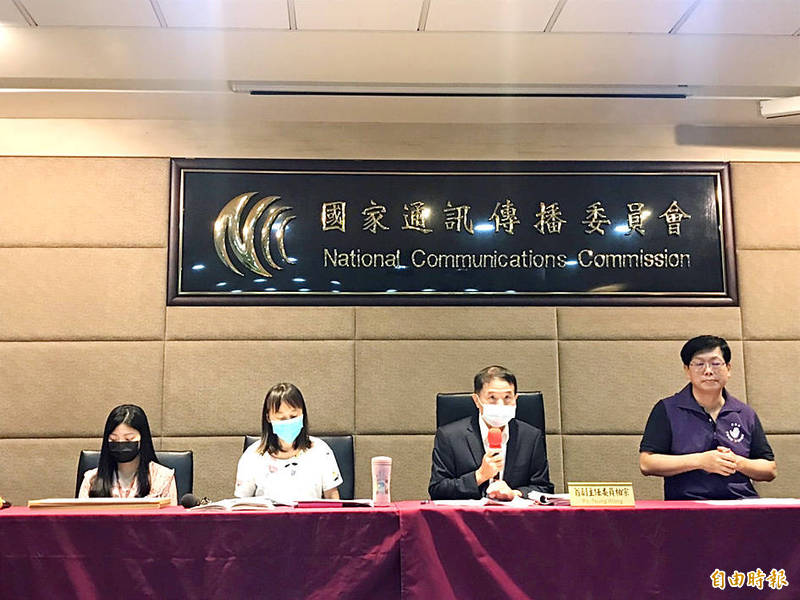《TAIPEI TIMES》 Digital service act stresses transparency

National Communications Commission officials in Taipei yesterday announce the agency’s approval of a draft digital intermediary service act. Photo: Yang Chin-chieh, Taipei Times
DISCLOSURE: The NCC approved the proposed act to regulate digital intermediary service providers to protect users’ rights, settle disputes and remove disinformation
By Shelley Shan / Staff reporter
Online platforms that have more than 2.3 million active users would be declared “designated online platform operators” and required to disclose their recommendation algorithms in user service agreements, the draft digital intermediary service act (數位中介服務法草案) approved yesterday by the National Communications Commission (NCC) says.
Previously known as the “digital communications draft act,” the formulation of the bill references the EU Digital Services Act, which the European Parliament passed in April.
Like the EU Digital Services Act, the draft act regulates digital intermediary service providers, NCC Deputy Chairman and spokesman Wong Po-tsung (翁柏宗) told reporters at a weekly news conference, adding that the new title more accurately reflects the content of the proposed law.
The draft act defines “digital intermediary service providers” as those providing Internet connection, caching and data storage services, Wong said.
Data storage service providers are further divided into “online platform operators” and “designated online platform operators,” he said.
The proposed act, which consists of 11 articles, stipulates that all digital intermediary service providers are obligated to disclose names of representatives and their contact information in Taiwan, and that overseas service providers must be represented by a local agent.
In addition to publishing user agreements and annually producing a transparency report, service providers are obligated to offer information on users following rulings by a court or administrative agency.
They should also follow court-issued restraining orders or emergency restraining orders to remove illegal content and disinformation, the commission said.
All digital intermediary service providers must also record the court rulings, administrative rulings and restraining orders they have received in a database, the draft act says.
However, the draft act imposes special obligations on online platform operators and designated online platform operators, on top of those laid out for all digital intermediary service providers.
Aside from taking down illegal content when notified, they must notify users when their content has been removed or their access to platforms have been restricted, the draft act says.
“Online platform operators would be asked to produce a more detailed transparency report, which includes consumer complaints and other relevant data,” NCC section head Liu Chia-chi (劉佳琪) said. “It should offer a system for users to dispute content that has been removed or a service that has been suspended or terminated, as well as provide a third-party arbitration mechanism to settle disputes.”
They are obligated to prevent users from repeatedly posting illegal content, disclose the information of sellers and advertisers on their platforms, and give priority to complaints filed by certified content informants, she said.
They must also disclose the algorithm that determines the placement of advertisement, she said.
Designated online platforms, which refer to those that have more than 2.3 million active users in Taiwan, must meet four more obligations, she said.
“Each year, they must analyze and assess major systematic risks facing the platforms, such as dissemination of illegal content, and then address the risks using reasonable, proportional and effective measures,” Liu said. “In addition, they must disclose their recommendation algorithms in user agreements, including how they will affect users and whether users are allowed to adjust the algorithms.”
Those that fail to meet any of the four obligations would be fined between NT$1 million and NT$10 million (US$33,690 and US$336,904), the commission said.
The draft act also authorizes the commission to continue fining operators until they meet their obligations, or to terminate their services if they repeatedly refuse to comply with the regulations.
The NCC can require designated platform operators to undergo an independent audit, and operators must submit the audit report to the commission, Liu said.
Asked whether the draft act would regulate platforms such as the Professional Technology Temple (PTT) bulletin board, Wong said it is a non-profit platform, and is different from YouTube and Facebook.
The commission will list the “designated online platform” after the draft act is approved by the legislature, Wong added.
Chinese short-video hosting service Tik Tok is subject to regulations of the Act Governing Relations Between the People of the Taiwan Area and the Mainland Area (兩岸人民關係條例), he said.
新聞來源:TAIPEI TIMES



















